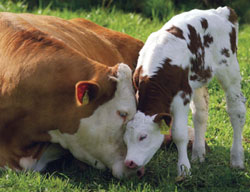The US Department of Agriculture (USDA) is abdicating its enforcement responsibilities, says the Cornucopia Institute in a letter and official complaint to the head of the National Organic Program (NOP).
Back in 2005, Cornucopia complained that Dean Foods and its WhiteWave subsidiary were confining cattle in pens and buildings instead of providing access to pasture and grazing as federal organic law requires. They provide dairy products under the Horizon Organic label.
Two legal complaints were closed by the NOP without a site visit or investigation.
"This performance and the National Organic Program, during both the Bush and Obama administrations, should be an embarrassment to all USDA political appointees and staff. It appears that the NOP is making accommodations for industrial-scale dairies, and their owners and commercial patrons, to operate outside of the spirit and letter of the law while materially damaging the ability of family-scale farmers to compete in the marketplace," says the letter.
Cornucopia believes that Dean Foods, with its heavy lobbying and campaign financing has become "indemnified" from USDA enforcement.
"Just as we have banks that have become ‘too big to fail,’ in organics we see Dean Foods and WhiteWave (recently spun-off in an IPO) repeatedly and successfully flashing their ‘get out of jail free card’ purchased by influence peddlers in Washington," says Mark Kastel, Cornucopia’s Senior Farm Policy Analyst.
The use of these allegedly illegal techniques has catapulted the Horizon label to being the biggest organic brand in the entire industry.
While Horizon has somewhat reduced the number of cows from 8000, allowing them some pasture time, they also increased the frequency of milking – from twice a day to three and even four times a day.

"Properly managing an organic dairy farm by moving the herd to fresh pasture after each twice-per-day milking becomes more and more difficult as herd size gets larger," says Kevin Engelbert, a certified organic dairy farmer in New York. "If a farm gets to the point of milking thousands of cows, 24 hours a day, the logistics of getting the herd from the milking facility to fresh grass, legitimately grazing – as required by law – becomes impossible."
This level of milk production is possible only in factory farm situations, not legitimate family-scale organic dairies.
Interestingly, this past December, WhiteWave sold its industrial dairy to private investors in Idaho, although its Horizon brand continues to purchase its milk.
"There is no statute of limitations in terms of enforcing federal organic standards," says Kastel. "We are asking the USDA to reopen our original complaints and fully investigate our new allegations that the cows on this dairy produced unreasonable amounts of milk based on skirting the requirement that they be fully grazed."
There’s another way to tell if cows have access to the pasture they need to be healthy – by analyzing milk’s nutritional profile.
According to tests done by a dairy publication, The Milkweed, the lowest nutritional profile is from Aurora Organic Dairy, which was fined because it actually was a factory farm. It supplies certified organic dairy products to Walmart, Costco, Target and other chains. Horizon is second from the bottom.
"Small organic dairies nationwide have struggled with drought, flooding and oppressive heat. Still, we have pastured our cattle as required by the National Organic Program," says Jim Goodman, who milks 45 cows in Wisconsin. "We have provided a product that consumers expect when they buy organic and we make it work economically – without cutting corners."
"If factory farm organic dairies are unwilling or unable to meet pasture provisions, then perhaps it is time they are notified that their continued noncompliance to the National Organic Standards has gone on too long and they should seek a non-organic market for their milk,"
adds Goodman.
In December, WhiteWave bought Earthbound Farms, the largest organic produce grower in the US, which was family-owned.
Organic farmers are also fighting the huge influx of GMO crops – not easy while former Monsanto employees work for the USDA.
